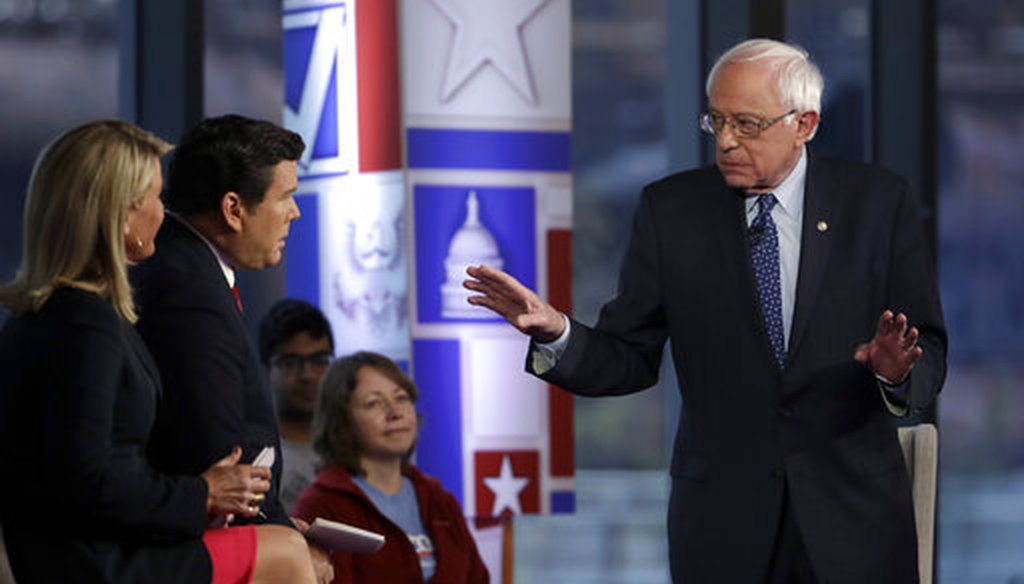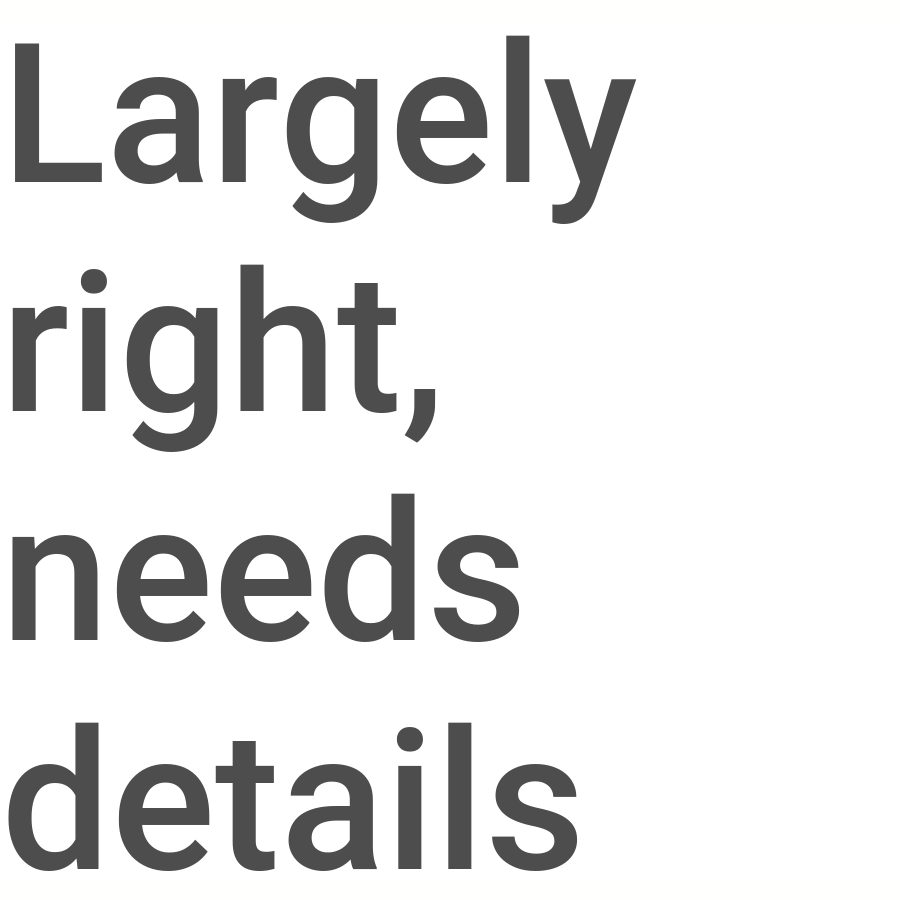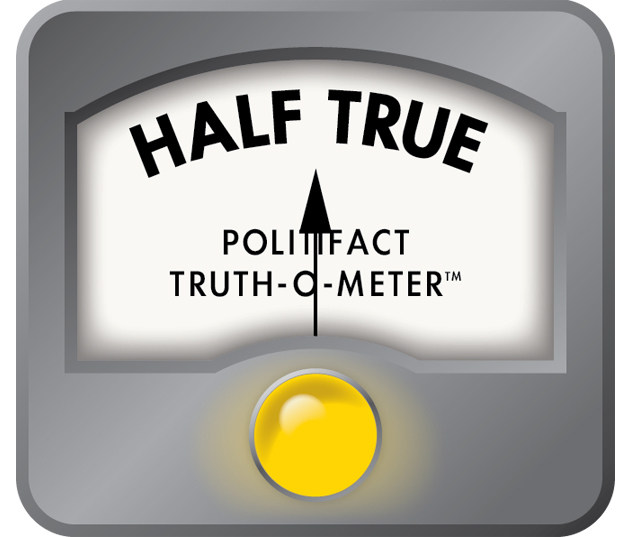Stand up for the facts!
Our only agenda is to publish the truth so you can be an informed participant in democracy.
We need your help.
I would like to contribute

Sen. Bernie Sanders speaks during a Fox News town-hall style event Monday April 15, 2019 in Bethlehem, Pa. (AP Photo/Matt Rourke)
Sen. Bernie Sanders’s town hall on Fox News was not a visit to the lion’s den. Judging from the cheers, the audience included plenty of voters open to his message of taxing the uber-rich to pay for more government to help the average Joe.
But hosts Martha MacCallum and Bret Baier peppered the Democratic presidential candidate and self-declared democratic socialist with questions that would strike a chord with a conservative audience. Medicare for All might sound great, they asked in one key exchange, but who would foot the bill?
Sanders pushed back with many facts at his fingertips. We checked out some of his talking points for accuracy.
Sanders: In the Republican tax bill, "83% of the benefits went to the top 1%."
This is only partly true, that part being the last years of the 10-year forecast.
Sign up for PolitiFact texts
There’s no question that the top 5 percent do the best by far under the 2017 Tax Cuts and Jobs Act. But in the early years, about half of the tax breaks go to the bottom 90 percent of taxpayers. It’s only later that the picture skews as hard toward the wealthiest, as Sanders said. When Democrats and their supporters have made this claim before, we never rated it better than Half True.
Sanders: The United States has "three families owning more wealth than the bottom half of the American society."
True.
Based on a 2017 report, the three wealthiest Americans — Bill Gates, Jeff Bezos and Warren Buffett — together were worth $248.5 billion. The wealth of the bottom 160 million people (the bottom half) was $245 billion. The specific numbers have changed, but we’ve seen nothing to suggest the comparison is any less valid today.
Sanders: "You know what unemployment is in Germany now? 3.1 percent. In Japan it's 2.8 percent. In the U.K., it's a hair higher than us."
This is accurate.
The Fox News hosts brought up U.S. economic gains under President Donald Trump. Didn’t that progress, they asked, weaken Sanders’s case that a totally different approach is needed?
Sanders noted that while unemployment is at historic lows today, it had been falling for years before Trump took office — from 10 percent down to 4.5 percent. And he said many other countries, untouched by Trump’s policies, were also doing well.
According to Eurostat, the European Commission’s data warehouse, the unemployment rate in Germany is 3.1 percent, in Japan it’s 2.3 percent and the United Kingdom has a 3.8 percent rate.
The latest unemployment figure from the Bureau of Labor Statistics for the United States is 3.8 percent.
Sanders: "You have a situation now (since Trump took office) where 7 million more people lack health insurance that used to have it."
This is an exaggeration. We rated a similar claim Half True.
Sanders’ number has its roots in a January 2019 Gallup estimate. The share of people telling pollsters that they lacked insurance was up 2.8 percentage points from its low in 2016. Gallup ran the numbers and converted that rise into 7 million people who lost insurance.
But Gallup’s 2016 low was lower than other reports back then, which made the jump in 2018 look larger.
The gold-standard government survey found a rise of about 1.3 million people.
Sanders: "Amazon, owned by the wealthiest person in this country, paid zero in federal taxes."
This is largely right but needs clarification.
Yes, Amazon reported to the SEC that it paid no federal income taxes in 2018. And when Sanders has specified that Amazon paid no income taxes before, we’ve rated that True.
But for the record, he skipped over specifying the income tax, and it’s worth noting that Amazon paid the employer share of payroll taxes on its 647,500 full-time and part-time employees.
"At over 7 percent of pay, that’s a lot of money," said University of North Carolina accounting professor Jeffrey Hoopes.
Also, while Jeff Bezos founded Amazon and runs the company, he owns about 16 percent of the stock, so he doesn’t own the entire firm. But as Hoopes emphasized, "he does call the shots."
Sanders: Trump’s last budget calls for a "$845 billion" cut in Medicare over 10 years.
This is an exaggeration.
Many Democrats have said that Trump’s FY 2020 budget aimed to cut Medicare by $845 billion, which we’ve rated Mostly False.
The reality is that about $250 billion of that would still be spent on the same Medicare programs for hospitals, but it would come from the general federal budget, not the primary Medicare trust fund. So right off the bat, the reduction is closer to $600 billion.
Factoring other shifts, estimates put the budget reductions somewhere between $515 billion and $600 billion over 10 years.
Importantly, spending in real terms rises throughout the period. The cut is a reduction from the path Medicare would have been on, if everything stayed the same.
Republicans, we should note, leveled the same charge against Obama. It was just as misleading.
Sanders: With the Yemen resolution, "for the first time since the War Powers Act was passed 45 years ago, we succeeded in the House and the Senate."
This is accurate.
The United States has provided indirect support to Saudi Arabia’s attacks in Yemen, attacks that included bombing in civilian areas. Both the Senate and the House passed resolutions calling for an end to any U.S. involvement. Trump vetoed it, with little chance that it would be overturned.
Historian Christopher Nichols at Oregon State University told us, "it is the first time both chambers of Congress have invoked the same war-powers resolution, agreed, and passed such a resolution explicitly designed to end U.S. military engagement in a foreign conflict."
Our Sources
Fox News, Town Hall with Bernie Sanders - Part 1, April 15, 2019
Fox News, Town Hall with Bernie Sanders | Part 2, April 15, 2019
EuroStat, Unemployment, accessed April 17, 2019
Securities and Exchange Commission, Amazon 2018 annual report, February 2019
Email interview, Jeffrey Hoopes, professor of accounting, University of North Carolina, April 17, 2019
Email interview, Chistopher Nichols, associate professor of history, Oregon State University, April 17, 2019


 PolitiFact Rating:
PolitiFact Rating: 
 PolitiFact Rating:
PolitiFact Rating: 




















































